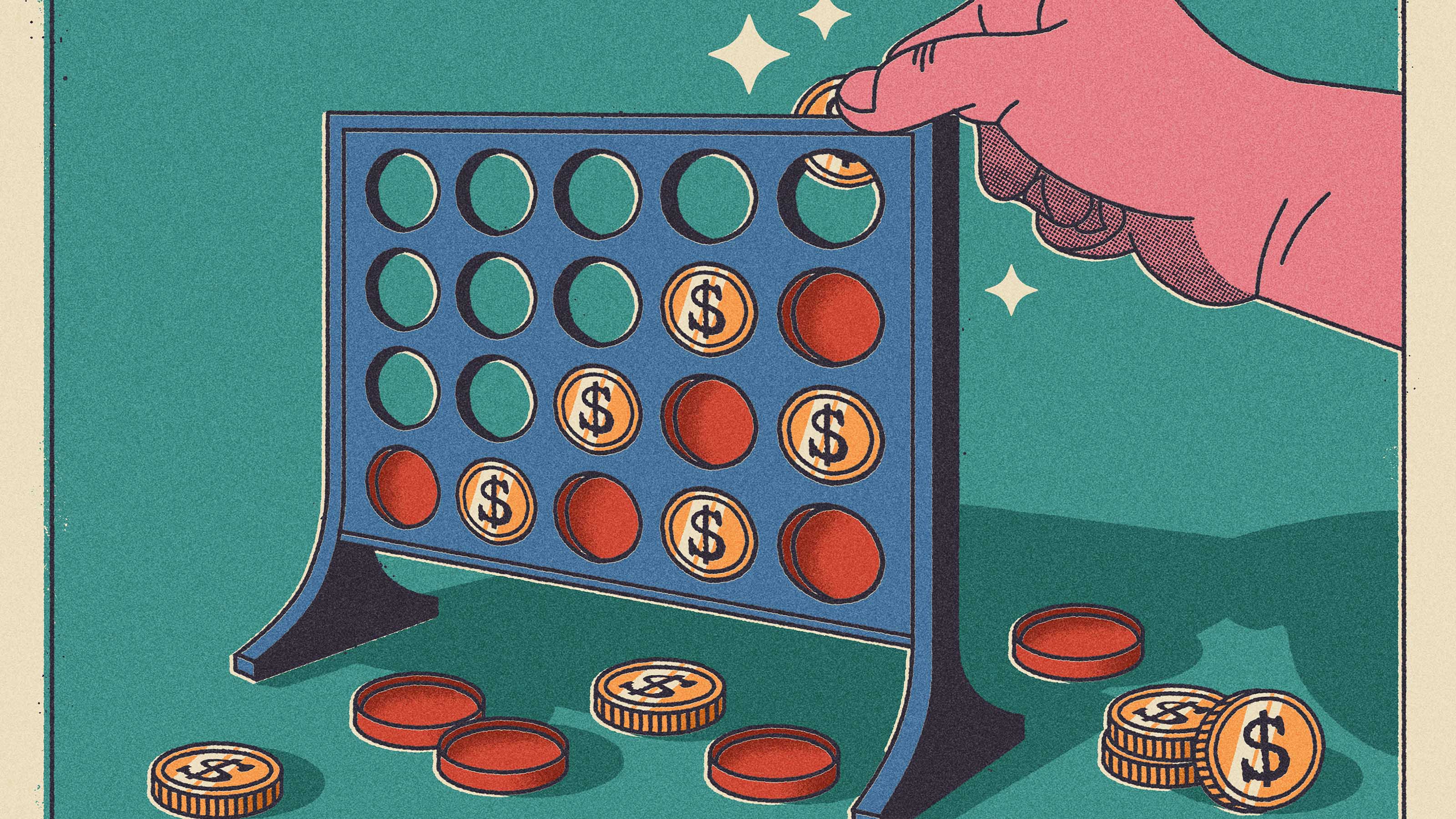I Do Not Like Investing Spam!
Our practical investor has good rhyme and reason for blocking out investing noise.

Profit and prosper with the best of Kiplinger's advice on investing, taxes, retirement, personal finance and much more. Delivered daily. Enter your email in the box and click Sign Me Up.
You are now subscribed
Your newsletter sign-up was successful
Want to add more newsletters?

Delivered daily
Kiplinger Today
Profit and prosper with the best of Kiplinger's advice on investing, taxes, retirement, personal finance and much more delivered daily. Smart money moves start here.

Sent five days a week
Kiplinger A Step Ahead
Get practical help to make better financial decisions in your everyday life, from spending to savings on top deals.

Delivered daily
Kiplinger Closing Bell
Get today's biggest financial and investing headlines delivered to your inbox every day the U.S. stock market is open.

Sent twice a week
Kiplinger Adviser Intel
Financial pros across the country share best practices and fresh tactics to preserve and grow your wealth.

Delivered weekly
Kiplinger Tax Tips
Trim your federal and state tax bills with practical tax-planning and tax-cutting strategies.

Sent twice a week
Kiplinger Retirement Tips
Your twice-a-week guide to planning and enjoying a financially secure and richly rewarding retirement

Sent bimonthly.
Kiplinger Adviser Angle
Insights for advisers, wealth managers and other financial professionals.

Sent twice a week
Kiplinger Investing Weekly
Your twice-a-week roundup of promising stocks, funds, companies and industries you should consider, ones you should avoid, and why.

Sent weekly for six weeks
Kiplinger Invest for Retirement
Your step-by-step six-part series on how to invest for retirement, from devising a successful strategy to exactly which investments to choose.
Now that we’ve stowed
all the holiday bags,
the boxes, the toys,
From just $107.88 $24.99 for Kiplinger Personal Finance
Become a smarter, better informed investor. Subscribe from just $107.88 $24.99, plus get up to 4 Special Issues

Sign up for Kiplinger’s Free Newsletters
Profit and prosper with the best of expert advice on investing, taxes, retirement, personal finance and more - straight to your e-mail.
Profit and prosper with the best of expert advice - straight to your e-mail.
the gift-giving tags,
your Practical Investor
got a Grinchy-Grinch thought
that has something to do with
the stocks that she’s bought.
You see, in the process
of researching those stocks,
I signed up at Web sites
that promised their thoughts.
Seeking Alpha, GuruFocus,
TraderPlanet, YCharts,
Value Line, Motley Fool,
Zacks, some upstarts.
Day in and day out, they
send me their news,
research and stock quotes,
and plenty of views.
One says “Buy!”
The other screams “Sell!”
Both say “Act quick!
Before the closing bell!”
Apple and Intel?
They say that they’re dying.
“No Lockheed. No Seagate.
Sell quick! We’re not lying!”
“Buy solar! Buy pharma!
Buy stocks that sell smokes!
Pay attention to us!
We’re serious blokes!”
I fret and I worry.
Do they know something new?
Or is this just opinion,
an uninformed view?
Sage advice is nice—
but when just opinion,
every Tom, Dick and Sally
can claim that dominion.
Check the writer’s credentials,
and yours might be prouder.
The difference with bloggers
is just that they’re louder.
Half the advice is plain wrong—
if you track it, you know it.
And this money’s your future.
It’s bad if you blow it.
But the things that they say
still stick in your mind,
making you wonder if
you’re deluded or blind.
So we investors must fight—
fight to keep poise,
when dealing with the market’s
noise, noise, Noise, NOISE.
The problem I see with
all the noise that they’ve made
is their thoughts and opinions
may cause you to trade.
Unless a move is compelling,
it makes sense to stall it.
Too much buying and selling
is bad for your wallet.
All trades cost money.
They mean taxes and fees.
Do them too often,
and returns fall to their knees.
In studies by professors
Odean and Barber,
they make a great case
that your money goes farther
when you buy solid firms
with finances like rocks.
You should hold them forever—
just sit on their stocks.
Watch them with faith,
like Horton would do
(when hatching Mayzie’s egg,
or hearing a Who).
We must keep our own counsel
when investing our money;
frittering it away causes
results that aren’t funny.
Research your stocks, look at
earnings and cash flow.
Keep your ears open for the
things you should know.
But when pundits start
screaming, you should not blink.
The best way to invest is to be
quiet and think.
This is a journey.
It’s not a short race.
When investing your cash,
set your own pace.
I hope that this column
was not too abstruse.
I send thanks and apologies
to the good Dr. Seuss.
Profit and prosper with the best of Kiplinger's advice on investing, taxes, retirement, personal finance and much more. Delivered daily. Enter your email in the box and click Sign Me Up.

-
 The New Reality for Entertainment
The New Reality for EntertainmentThe Kiplinger Letter The entertainment industry is shifting as movie and TV companies face fierce competition, fight for attention and cope with artificial intelligence.
-
 Stocks Sink With Alphabet, Bitcoin: Stock Market Today
Stocks Sink With Alphabet, Bitcoin: Stock Market TodayA dismal round of jobs data did little to lift sentiment on Thursday.
-
 Betting on Super Bowl 2026? New IRS Tax Changes Could Cost You
Betting on Super Bowl 2026? New IRS Tax Changes Could Cost YouTaxable Income When Super Bowl LX hype fades, some fans may be surprised to learn that sports betting tax rules have shifted.
-
 The Most Tax-Friendly States for Investing in 2025 (Hint: There Are Two)
The Most Tax-Friendly States for Investing in 2025 (Hint: There Are Two)State Taxes Living in one of these places could lower your 2025 investment taxes — especially if you invest in real estate.
-
 The Final Countdown for Retirees with Investment Income
The Final Countdown for Retirees with Investment IncomeRetirement Tax Don’t assume Social Security withholding is enough. Some retirement income may require a quarterly estimated tax payment by the September 15 deadline.
-
 How to Beef Up Your Portfolio Against Inflation
How to Beef Up Your Portfolio Against Inflationinvesting These sectors are better positioned to benefit from rising prices.
-
 Taxable or Tax-Deferred Account: How to Pick
Taxable or Tax-Deferred Account: How to PickInvesting for Income Use our guide to decide which assets belong in a taxable account and which go into a tax-advantaged account.
-
 Smart Investing in a Bear Market
Smart Investing in a Bear Marketinvesting Here's how to make the most of today’s dicey market.
-
 How to Open a Stock Market Account
How to Open a Stock Market Accountinvesting Investing can be fun, but you need a brokerage account to do it. Fortunately, it’s easy to get started.
-
 The Right Dividend Stock Fund for You
The Right Dividend Stock Fund for YouBecoming an Investor Dividend stock strategies come in many different flavors. Here's what to look for.
-
 Alternative Investments for the Rest of Us
Alternative Investments for the Rest of UsFinancial Planning These portfolio diversifiers aren't just for the wealthy.